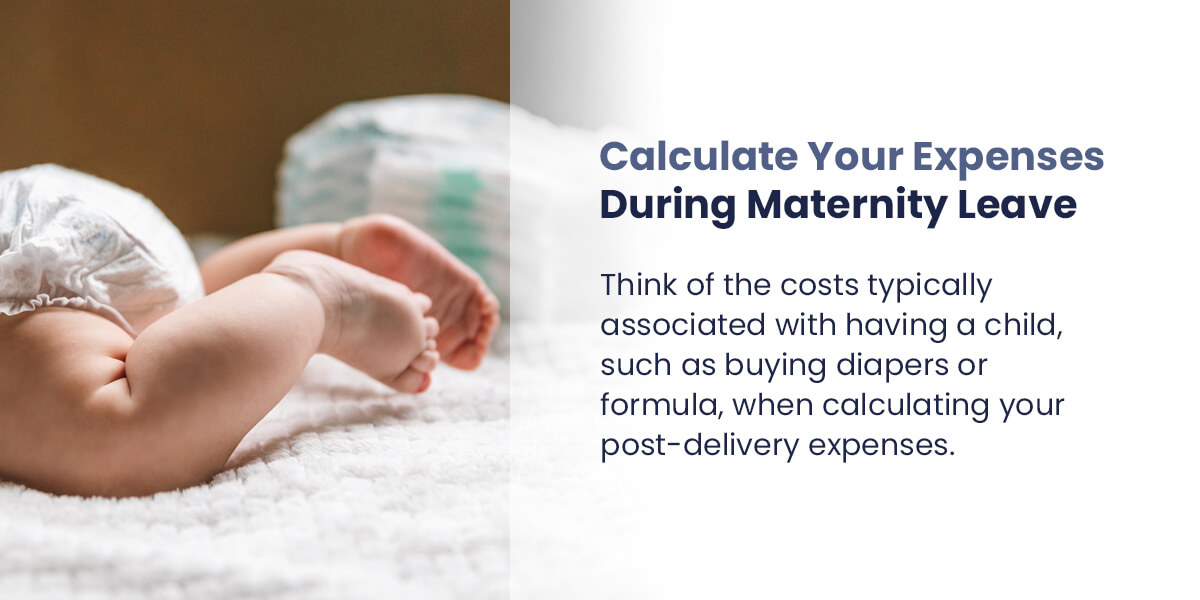
While babies can be a blessing, they're also a pretty expensive one. In the United States, the average cost of giving birth is $10,800 — and it's much pricier for individuals without health care. Then, there's the cost of raising a child to the age of 18, which is close to one-quarter of a million dollars. In addition, paid leave is rare in the U.S. Many employers let you take up to 12 weeks of unpaid leave, which limits your income while you care for a newborn.
If you're planning on having children soon, it's important to have a plan for affording them. Start saving for maternity leave and your new family member as soon as possible to keep yourself on a budget after the birth.
How to Start Saving for a Baby
Part of saving for maternity leave involves knowing how much you'll need to spend during your time off. Some of the things you can do to prepare yourself include:
- Review your health insurance: Take a look at your health insurance plan to find out what it will or won't cover and to get a sense of how much you can expect to pay out of pocket for prenatal care, delivery, and postnatal care. In the U.S., most health plans cover pregnancy, childbirth, and maternity care, but how much coverage a plan offers can vary. Your out-of-pocket expenses can also vary base on your deductible amount. If you want to use specialized services during your pregnancy, your policy might not cover them.
- Create a budget: If you don't already have a budget, now is the time to make one. Add up all of your living expenses, including debt repayments and saving goals, to get an idea of how much you spend monthly.
- Make a list of baby stuff you'll need: Babies need a lot of stuff, such as clothing, bottles, car seats, and strollers. But they don't need everything the stores want you to buy for them. For example, your baby will probably be fine in the nondesigner stroller and in basic onesies instead of trendy styles. Ask friends and relatives who have children what items they ended up using and what they didn't need.
- Score free baby stuff: Try to get as much free stuff as possible to help cut your baby expenses. Your loved ones might be happy to hand down any unneeded baby gear to you. There are also plenty of local groups where parents give away items they don't use anymore.
- Calculate your expenses during maternity leave: Your budget will need adjusting after the baby comes along, so it's a good idea to calculate how much you'll need while you're on leave. Think of the costs typically associated with having a child, such as buying diapers or formula, when calculating your post-delivery expenses.
- Decide what you can cut from your budget: Now's the time to examine your spending and budget to see what you can easily cut before and after your baby arrives. If you regularly eat out at restaurants, you might not have time to do so after the baby is born, so that's one line item you can easily cut. Other possible things to cut include your daily coffee, going to the movies, and other nonessentials.
- Start setting money aside: Once you've discovered what you can cut out of your budget, set the money you would have spent on those items aside to give yourself a nest egg to live on while you're on maternity leave. It's a good idea to open a separate savings account for the baby so the money you'll need is all in one place.

How to Make a Maternity Leave Plan
Along with saving for maternity leave and your new baby, it's important to come up with a plan for actually taking your leave.
Pay a visit to the human resources department, if your company has one, or talk to your supervisor to find out what the company's leave policy is. It might be the case that the company offers a few weeks of paid leave or will pay you for the full 12 weeks. Your company might want to know the details of your maternity plan, such as when your due date is and when you plan on starting your leave.
If you're concerned about running out of money during your leave, it can be useful to brainstorm a few ways to improve your cash flow. Think of how to make money while on maternity leave. You might be able to manage a small side gig, such as doing remote work or making arts and crafts projects while the baby sleeps. If you have a partner, they might be able to work from home during your leave so you can split child care more evenly and still have some money coming in.
Budgeting During Maternity Leave
Having a baby arrive will change your life in many ways. You're likely to find what you value and prioritize shifts after the birth of your baby. If you're more concerned about your budget now, here are a few things you can do to ease your financial burdens:
- Buy used when you can: Babies outgrow things so quickly that it can seem like a waste of money to buy them something new every few weeks. Luckily, there are many secondhand baby clothing stores and people selling their no-longer-needed baby stuff through yard sales or online marketplaces. With the exception of car seats and diapers, you can pretty much get all of your baby's stuff secondhand for a substantial discount.
- Buy in bulk: Speaking of diapers, you're going to go through a lot of them. It can be a good move to buy bulk diapers, provided your baby doesn't outgrow the diaper size before you reach the end of your supply. The same is true of baby formula and jars of baby food. Bulk purchases end up costing you less per ounce than buying the smaller sizes. Just make sure you use the products before their expiration date to avoid waste.
- Get help where you can: Child care can be pricey, but there's likely at least one person in your life who would happily babysit for free, giving you a chance to rest and relax without having to add a line item to your budget.
- Get prepared as much as possible: Preparing your home for the new baby can help you stick to your maternity leave budget after their arrival. For example, prepping and freezing a bunch of easy-to-reheat meals, such as soup or lasagna, means you'll have something ready to go when you're exhausted and hungry. You'll be much less likely to give in to the siren's song of takeout when you have meals at the ready.
You want to spend as much time as possible with your new baby, but in the long run, taking 12 weeks of unpaid leave might not work with your budget. If you find that you will need help paying bills while on maternity leave, a personal loan can help bridge the gap in your finances.
Atlas Credit offers online personal loans with a quick approval process. If you're on maternity leave and need money, you can borrow between $100 and $1,400, depending on your needs. Apply today to help make your maternity leave go a little more smoothly.



